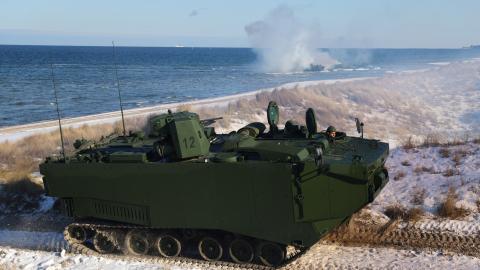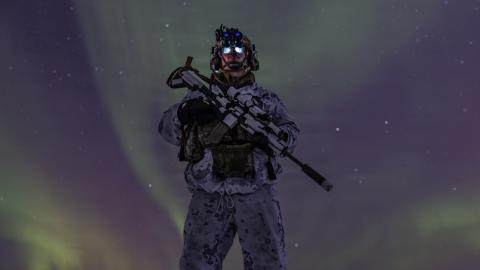
Event will also air live on this page.
Inquiries: mdewitt@hudson.org
The Baltic View of European Security
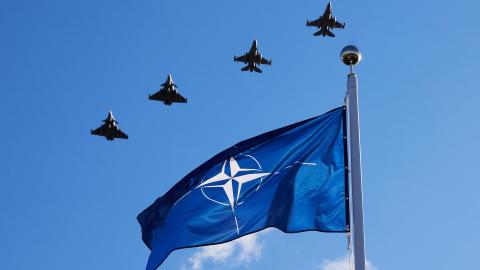
Event will also air live on this page.
Inquiries: mdewitt@hudson.org
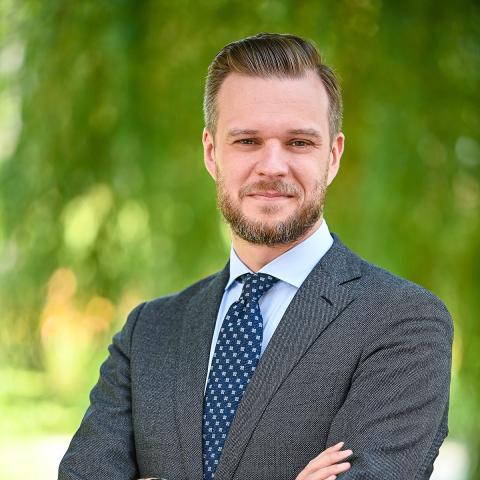
Minister of Foreign Affairs of the Republic of Lithuania
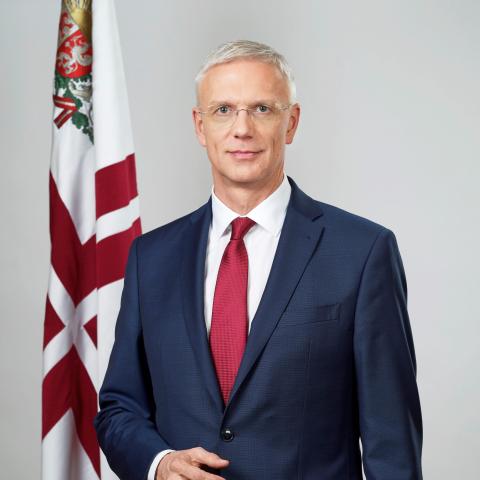
Minister of Foreign Affairs of the Republic of Latvia
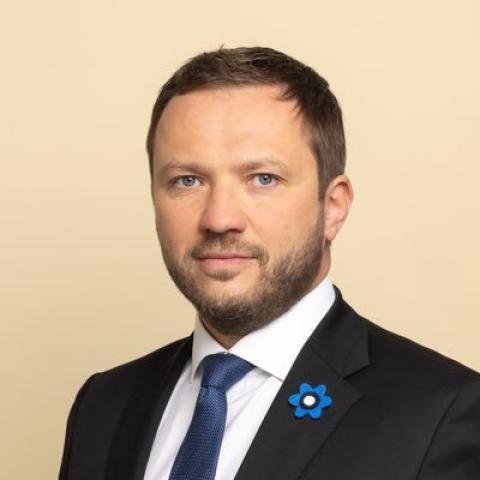
Minister of Foreign Affairs of the Republic of Estonia

Senior Fellow and Director, Center on Europe and Eurasia
Peter Rough is a senior fellow and director of the Center on Europe and Eurasia at Hudson Institute.
The geopolitical landscape of Northern Europe is rapidly changing. Russia’s large-scale invasion of Ukraine hit the region like an earthquake, triggering the most momentous change to Northern European security in decades: the latest round of North Atlantic Treaty Organization (NATO) enlargement, which welcomed Finland and Sweden to the alliance two decades after the Baltic states’ accession.
The foreign ministers of Lithuania, Latvia, and Estonia will sit down with Hudson’s Peter Rough to mark this special anniversary and reflect on the work that remains ahead. As all three leaders have pointed out, NATO enlargement should not lull Europe into a false sense of security. It is crucial that the West, led by the United States, continues to stand up against Russia’s war on Ukraine.
Event Transcript
This transcription is automatically generated and edited lightly for accuracy. Please excuse any errors.
Peter Rough:
Good morning, and welcome to Hudson Institute. Thank you so much for being here in person. I’d also like to welcome those of you who are watching via the live stream at home on hudson.org, as well as our friends joining across the country on C-SPAN. In November of 1991, Hudson Institute, welcomed to its then headquarters in Indianapolis, Indiana, the three prime ministers of the newly independent Baltic States to the first ever Baltic Conference in the United States. At that occasion, Vice President Dan Quail said, “The ideas of freedom and self-government bind the Baltic peoples, the American people, and institutions like Hudson.” I’m Peter Rouse, senior fellow and the director of the Center on Europe and Eurasia here at Hudson. In that same spirit as Vice President Dan Quail, it’s my honor and pleasure to welcome the three foreign ministers from the Baltic States here to Hudson this morning. From Estonia, Margus Tsaknah joins us, Krisjanis Karins from Latvia, and of course, Gabrielius Landsbergis from Lithuania. Welcome gentlemen to Hudson Institute.
Margus Tsahkna:
Thank you very much. Good morning.
Peter Rough:
We’ll see if they’re still applauding at the end. If you get a premature applause, that’s always a high bar to set.
Margus Tsahkna:
Good start.
Peter Rough:
Yeah, I’ll begin with you, sir, because one week ago today, if we can have a round on Ukraine to start us off, you published an op-ed in the Financial Times under the rubric of how to help Ukraine prevail, which builds on some of the work your defense ministry put out in the past few months, an excellent white paper which got a lot of attention in Washington titled Setting Transatlantic Defense Up for Success, A Military Strategy for Ukraine’s Victory and Russia’s Defeats. You set out an eight-point plan for how we can help Ukraine achieve victory. Now, as you know in Washington, but really across the west, there is a bit of fatigue, if we can call it that, amongst some who question whether or not Ukraine is really on the path to defeat, to victory and whether or not it can actually achieve victory. Perhaps for a few minutes, you could outline why you think it’s important to support Ukraine and why that eight-point plan can achieve success.
Margus Tsahkna:
Thank you. Thank you for receiving us here as well. Symbolically, somehow this week we are establishing our . . . We’re celebrating the 20 years, all of us, in NATO, but today, we celebrate 75th anniversary of deportation, one of the biggest deportation in Baltic, more than 60,000 people were deported, and exactly the same thing is going on in Ukraine right now. So we must understand that Ukraine is not fighting for their own freedom. Ukraine is fighting instead of us, not only for us, but instead of us. We see it literally as a front-runner on the board of Russia. So these troops, I saw as a defense minister of Estonia 2016, ’17, 120,000 troops ready to go from Russia side to us. They’re not existing. Literally, they’ve sent Ukraine, they’re dead. The plan is very easy, actually. First thing is we have to define our goal. That’s the case. The goal must be that Ukraine will win the war. This is important for us. Without this winning any so-called peace or wrapping up, it means that we will have much more bigger problems in the future and near future.
So as well as you know, the public reading about that, about after three, four years, these capabilities I was talking you, they will be restored the other side of the native border. The difference is that Putin has turned on and pushed the button of the war machine. So we saw so-called elections like a week ago and now, he’s full scale in. I think that we will see the mobilization, full scale mobilization, also the change of rhetoric that is now, it is not a special operation, this is full scale war. So what we must do is to give Ukrainians what they ask because we don’t have to fight right now ourselves. So weapons, ammunition, we must be sure that the further perspective for Ukraine is as well as a full member of NATO because the gray areas or so-called neutrality close to the Russian border, this is a green light for Putin. We saw it in Georgia, we saw it in Ukraine in 2014, repeatedly in Iran. Also, the Swedish people understood that. They voluntarily joined NATO after more than 200 years of neutrality policy.
So this is the feeling what we have, but we have to do the very practical things and we do in Europe, we do more. We have actually decided 50 billion European fund. Also, we started to use this European peace facility about five billion this year for the military support. But also, we have signing as Estonia, the long-term commitments that 0.25% of GDP per one year military support with Ukraine. But actually, this $61 billion, the Ukraine package, which is not adopted right now from US side is 0.25% of US GDP. It’s actually one day GDP, only one day worth. Altogether, if we all signed this 0.25, it is 120 billion military support in one year and it is good enough for Ukraine to push Russia back. Also, one topic we are discussing as well and during our visit here is who must pay the recovery process of Ukraine because it’s harder and harder to explain to our taxpayers, in US as well, that why we are using our taxpayer’s money instead of Putin’s or oligarchs’ money.
So how can we use the frozen assets of Russia during the war? We can do it. In Estonia, we are adopting right now for the spring in our parliament the low trough, how can we do it legally? So we have many aspects, but the most important is to define that Ukraine must win. We must support Ukraine. It is doable because it is doable. We have no other options. All the other options are worse many times, and it pays. We will pay a lot of that. I’m not talking about Baltic States, I’m talking about as a democratic world. So China is watching very carefully what is the end of this war? Everybody’s watching, not democratic countries. So I think that US must wake up as well, showing the leadership more because Europe is doing more right now. So it’s for the beginning.
Peter Rough:
Well as you wrote in the Financial Times, we must find a way to use it being Russia’s frozen or blocked assets to return to that theme, and its apropos was in the Financial Times because that’s where in December there were the first reports that the White House is pushing the G7 to look into ways of repurposing Russian frozen assets. As you know, there was recently a meeting of the Weimar Triangle of Prime Minister Tusk, President McCall and Chancellor Schultz, where there was some progress made on this issue. As you come to Washington from Europe, we at Hudson have, for example, worked with Senator Rich and with Congressman McCall in the Repo Act. So, in Washington, this issue is moving. Where does it stand in Europe at large?
Margus Tsahkna:
There is a great need for the leadership in G7 and I think that US is having that and will have it in, I hope that in more practical steps, adopting the different decisions. But in Europe, you’re right, we have made a political decision that we are going to use the profits of the frozen assets and we can use it as well for not only support Ukraine of recovery process, but I do hope that finally, we are going to use it as well for military purposes. We are talking about like 46 billion euros per year, the first year. This political decision has been made last week in our European Council.
So we are making some process, but we are pushing heavily as well that let’s deal with the real assets as well. Not only the Russian public assets, but also the oligarchs’ assets. So Russia is so much afraid about that. Every time we are talking about, every time we are moving forward, we are getting the painful reaction from Russia because we must send a message as well that business as usual is not going to continue after the so-called piece or whatever they’re hoping to get. So these are the progresses, but the US has the big leader role here to do to hold in front of G7 because this is crucial as well. Europe is moving.
Peter Rough:
For Mr. Karins, the view from Riga when it comes to the war in Ukraine. Very specific question, but I’ll let you take it where you like.
Krišjānis Kariņš:
I want to follow up on what my friend Margus is saying about the need for Ukraine to win. Maybe someone sitting here in Washington say, “Well, of course, the Baltic ministers think it’s very important because they live next to Russia, but well, why should the US care? I mean, it’s far away and it’s maybe our problem, but why is it your problem? If you think about it, the US has had one heck of a winning streak. After the end of the Second World War, the US created a system that we call the rules-based system. You could say it’s headquartered in New York at the United Nations. It has its, shall we say, challenges, but it’s the best thing that has happened to the world, probably if you look back in history, forever. Germany’s success as a rich and thriving democracy is thanks to the US Marshall Plan after the war. Japan’s success as a rich and thriving democracy is thanks to US efforts.
South Korea, Europe’s success, the Baltic States independence or regaining our independence after 50 years of occupation is a part of this success because the US has stood rock solid behind the rules-based system. That rules-based system has had a very positive effect on US wellbeing, the economy. I mean, US has thrived. It’s not just giving, it’s getting a lot of taking. Where are the US exports going in the industry and the jobs? That’s the world that was created. Now, that world which the US essentially created at the end of the Second World War is under challenge and severe challenge. So you have China rattling its sabers. We see what’s happening in the Philippines in the Taiwan straits elsewhere. China is rattling its sabers. Russia is not rattling its sabers. Russia is fighting a full out war in Europe as we sit here in beautiful sunny Washington DC. It’s two years since they’ve been doing this. They are on a war economy. They are spending 40% of their budget on defense and internal security. They’re not putting it into hospitals, into roads, into education, into welfare. They’re putting it into the military machine.
We in NATO, in the US and in Europe, we’re really not up to speed yet. We have to realize that China is rattling its sabers. Russia is fighting a war, and they’re fighting a war to turn the system that the US created on its head. Not the rule of law, but the rule of brute force bringing us back, I don’t know, into the dark ages, into some time I think no one wants to revisit and the Ukrainians are experiencing that as we speak today. So in Latvia and my neighbors, we go full out. We invest in our own defense. Budgeted 2.4% this year. It looks like we’re going to hit 3% this year, and we will be going beyond that in the future as well. We’ve reinstated conscription, so we’re building up our armed forces. We’re buying three expensive weapon systems, air defense, coastal defense, the HIMARS rocket systems to boost our own firepower. NATO and US presence in the Baltic is growing as well. The US presence is very well felt and very, very well received.
But we need to really focus our minds on what the goal is, that Ukraine has to win and Russia has to lose. It’s a necessity because the other corollary is Ukraine loses and Russia wins. That has a direct negative effect, not only regionally, but globally. As Margus said, everyone around the world is watching. There’s a club of autocrats. They probably smoke really fat cigars, and they don’t have the windows open. This club of autocrats is looking. So Russia is challenging what will the US and NATO ultimately do? Try to cut a deal? Oh, that will be great for the autocrats, but for democracy and for the way of life that we all enjoy from the Baltics, through Europe, through the US, this is under direct threat. You can think that it’s a regional problem. It’s not. It is a global problem and it is a direct challenge to US power and authority around the world.
Peter Rough:
I would agree it’s a global problem, but even if it were just a regional one, Europe is a tier one region of the world. To those who pit spending at home to support a Ukraine abroad, I would just say that support for the European order, given the massive amounts of foreign direct investment, the huge trade flows actually enriches America so that we can focus on some of our domestic spending priorities. So I share your views entirely on that.
Krišjānis Kariņš:
Well, and I say we’re buying these weapons system, that means we’re taking money and giving it to someone else. If you look at where we’re buying our weapons system, well you don’t have to look much further than the shores of the US. We’re buying a lot of our weapons from here, which goes directly into the US economy.
Peter Rough:
And because they’ve shown their power in Ukraine. Sir, the view from Vilnius, please.
Gabrielius Landsbergis:
Well, now it’s very difficult to find a different angle after my colleagues have spoken because basically we share the position, obviously. That’s clear. To go further, I mean, we have to understand that there is thinking, “Okay, so what can happen next? What’s the plan A,” and my colleagues were talking about the plan A and the plan A is Ukraine winning, Russia losing, order being restored in Europe, and all of us having a nice vacation somewhere. I know we’re thinking that this couple of years was very difficult, but when you see us struggling to support Ukraine or even as Margus said, even to define a strategy as to what the winning is and where do we need to get to and then how to get there, you have to then start thinking, “Okay, so is there anybody who is thinking about plan B?” So if Ukraine is not winning, then what’s the different reality? Then the numbers come in place. So just to give you an idea, so Russia started this war with about 800,000 troops in their regular army. Out of those 800,000, 200,000 were on Ukrainian water, ready to attack.
Currently, they do have about 1.2 million regular army. Out of those, about half a million are in Ukraine. So it’s almost twice as much military already in Ukraine than they had two years ago. Now, the defense minister, just a couple of days ago, just before the terror attack in Moscow, announced that they’re going to expand their regular army even further. That could bring them, if they’re successful, to 1.7 million regular army. These are the numbers that we have not seen not since the end of Cold War, but since the Second World War. We’re talking Stalingrad numbers. That’s really, really tells you, even just those numbers, they tell you a story that Russia is not planning to stop. If it doesn’t stop, then what happened next? Well, first of all, it’s about Ukraine. The country is in danger and that’s why my colleagues were talking that we need to pull all the resources that we can in order to stop them.
If we’re unable to, then other countries might start looking quite appealing to Putin, and that we’re talking Georgia, a country that has already been under attack in 2008 is, Maldova that, has a, well, in principle, a Russian-controlled part of its territory currently, Transnistria, where Russians already have troops. So for them, if they break through somehow towards that direction, the country is also feeling chill on their necks. Then the question is, could NATO be challenged? I think it’s a very sensitive question and many people say, “Look, this cannot happen. We’re that much more powerful.” Yeah, we are. Currently, yeah. I fully agree. We have more technological advance, we’re more technologically advanced, we’re better prepared, we’re better trained, and all the other things. But Russia is fighting an actual war right now, building up this army and expecting us to be politically not prepared, not militarily, but politically. The last number that I want to share with you, so before the Second World War, Great Britain had a spending of 4% of their GDP towards defense. During the war, they had spending of 40% of their GDP towards defense.
So it gives you an idea why does it cheaper and more efficient to win in Ukraine rather than a couple of years later, be spending 10 times the amount that we would have spent this year in order to win in Ukraine so that we would be defending and winning in NATO.
Peter Rough:
Well, thank you. One thing I think to add also to your point about Moldova, it’s often forgotten how many Romanian passport holders there are on the Right Bank in Chișinău-controlled Moldova. So immediately, you see trip wires to NATO, rather ominously on the near horizon if there’s a blow-through.
Gabrielius Landsbergis:
Yeah, I mean, Black Sea, now it’s safer and more secure because of Ukrainians being able to attack and limit Russian naval activity in the Black Sea. Unfortunately, we’re not doing that much right now because Turkey is not allowing ships to enter Black Sea. So I think that some of our allies on the Black Sea, I mean, allies from NATO such as Romania and Bulgaria, they do feel worried that if Ukraine is unable to hold, if their activity pushing back on Russians in Black Sea is not successful, then they would have questions, what’s next with them?
Peter Rough:
All right, well, let’s move from the dune and gloom to some celebrations because the minister has already mentioned this. March 29th will mark 20 years. When Dan Quail spoke 30-some years ago, you were newly independent countries. Now, you are a firm treaty allies of the United States. Perhaps we can start with Minister Karins from Latvia to talk a bit about what NATO membership has meant to you all, to you in particular, but then also what it would mean heading into the Washington Summit this summer and your expectations.
Krišjānis Kariņš:
Right. Well one of the direct effects of Russia’s war in Ukraine is a repurposed, stronger and larger NATO. So remember, we were 30 countries before the war. We are now at 32 with Finland and Sweden having joined and it was already mentioned, Sweden had 200 years of neutrality. They have not fought any wars in 200 years and they now have gladly joined NATO. Three years ago, all the three of us know our Scandinavian colleagues very well. The polls showed 15, 16%, one six percent support for NATO in both Sweden and Finland roughly. Now, the support is not unanimous, but it’s well over 80, 80%, and that’s why those countries are in. Why? Because they realize that what Russia has done, it has erased the idea of a neutral zone. It’s either Europe and NATO or Russia. There is unfortunately nothing in between. Now, we had, I guess, the privilege and the foresight and the ability to join NATO 20 years ago. This has underpinned all of our economies growing.
If we look at happiness indexes, actually in spite of the war, in spite of everything, people in our countries are actually quite content because we feel safe. But that does not mean that we don’t realize the danger. We realize the danger that Russia poses very well. But what we need to do with NATO now is to, “Okay, we’ll spend a little time celebrating and 20 years is 20 years,” but NATO needs to think of what its next 20-year plan is regarding Russia, because with the war in Ukraine, let’s fast-forward, we get our act together. Ukraine, with the aid, wins the war. The problem with Russia does not go away. Russia will still be an extremely aggressive and dangerous country. Remember, as Margus pointed out, Putin arranged his election. He will be in power for the next six years. That’s a signal to us, don’t expect change. So we have to come up with a policy, for lack of a better word, of containment of Russia. So the 20 years, that’s been great. What about the next 20 years? It won’t change. Russia won’t change. So let’s work that out.
That policy must be that we will have to continue to invest in our collective defense and be strong because there’s one language that Putin and leaders like him understand, and that’s the language of strength. Bullies in politics and countries behave just like bullies in the schoolyard. They always pick on someone that they perceive as being weak. So Russia thought Ukraine was weak, whoops. Two years later, they’re actually doing quite terribly in this war. Ukraine has regained half of the territory that they’ve lost. Ukraine is winning the naval battle in the Black Sea without a navy. The grain exports from Ukraine out of Odessa, they’re ongoing because Russia no longer controls the western portion of the Black Sea. They’ve had to go the other side of Crimea and they’re even losing ships there. So the Ukrainians are incredibly clever with the aid that we give them, but we will have this Russia challenge or problem for long-term and that’s where NATO needs to focus, how to contain them for the next 20 years with strength.
NATO’s strength has been to maintain peace and that peace has been maintained because of the very real understanding that if you touch any part of NATO, hell breaks loose on you and we need to get that message home to the Kremlin so that the Kremlin would never make the mistake of assuming that, as Gabrielius is saying, the political will is not there and NATO is, in some sense, weak. No, we are, in fact, quite strong right now, but we’ll need to keep that up for the next 20 years. So we better buckle in and prepare for the ride and make sure we give that clear signal to Moscow.
Peter Rough:
A quick follow-up on that. We at Hudson believe very much in hard power and conventional deterrence, but I would also note that you were leading the government as Prime Minister when there was a Belarusian hybrid attack of sorts on Latvia and really on the region at large. You also have a background, I believe, in Delaware, so if there’s another head of government from Delaware that wants to come to Hudson for an event, we’d be happy to host you anytime soon. But given that the NATO Center of Excellence in Helsinki is nearby, that hybrid warfare has seemed to be a Russian strategy since it doesn’t want to cross the conventional threshold in some areas. Can you just talk for a minute or two about hybrid warfare, your experiences, and how we’re dealing with that in the Baltic States, or not deal?
Krišjānis Kariņš:
We experience it, all of us, on a daily basis, but also in the US. So the first element is disinformation, sowing lies and sowing discord within society. So the Russians have a great knack. 10 years ago you could see it very easily, very bad English, weak argumentation, very transparent. They unfortunately learned from their mistakes and they get involved in all of our politics by finding an issue which is divisive and then trying to explode both sides of the argument. So in the US, let’s say abortion, very contentious issue. The Russian, if you trace back and look at where information or arguments are coming, I’m certain that you’ll see them fanning both sides of the argument. They look to make our societies weaker. On a practical level with my Lithuanian friend and with our Polish friends, for more than two-and-a-half years, we have been experiencing a continual pressure from Belarus on the Belarusian government organizing flights and arrivals of third country nationals into Belarus.
We have video footage that shows very clearly that the Belarusian Border Patrol is helping them and encouraging them to illegally try to enter the European Union, including cutting open of fences, et cetera, et cetera. We’re in very close contact with each other. We know that the groupings, they move up and down. Finland has now started to experience this. Our Estonian friends have gotten the first wind of this. So it’s not . . . I mean, Belarus is effectively 100% controlled by Russia. Belarusian independence is they didn’t lose a war, they simply succumbed to Russian pressure, Russia controls the military, and this, and we see this on a daily basis and cyber attacks, thankfully our collective cyber defenses are always one ahead of the Russians, but they’re getting better and better and we are having to invest more and more. They’re looking at critical infrastructure, they’re looking at not so critical infrastructure. If you can put down a website of any government access website, our economies are, you deal with the government via the internet. You don’t have to physically go, you just take something down even for two hours it can cause a headache.
So they’re working full out to try to weaken us, to try to take away a political will, and they’re telling us lies. One of the lies is that they are winning in Ukraine. They are getting slaughtered in Ukraine. That’s the truth. But they’re trying to tell us they’re winning, and it’s inevitable. It’s not. It’s the exact opposite. This is one of the insidiousness of their argumentation. They’re trying to take away our will to resist, and we have to realize that’s what they’re doing. They’re trying to take away our will to resist. When I was young, I was in track and field and I was a high jumper among other things. The key of being a good high jumper was not only to clear the bar, but to try to take away the belief in your competition that they can clear the bar and you come up to the competition, you say, “Oh Gabrielius, you look a little pale. Did you not sleep well?”
He’s thinking, “Am I pale? He’s starting to get worried. That’s all you need. You need to take away his conviction. That’s what Putin is doing to all of us. He’s trying to take away our conviction. Christ, NATO is 25 times the size, in terms of the economy of potential, as Russia. There’s no contention. But if we believe that we can’t, then they can do it. This is part of the hybrid is taking away our fundamental belief in ourselves.
Peter Rough:
Yeah. I see where there’s a lacking with Lithuanian rivalry. Perhaps we can go to Minister Landsbergis to follow up on . . .
Krišjānis Kariņš:
He’s not looking . . . He’s looking very good.
Gabrielius Landsbergis:
Thank you.
Peter Rough:
. . . on your experiences in NATO.
Gabrielius Landsbergis:
If ever, Krisjanis comes over and then ask if I’m pale, I will know where it’s coming from. That means that we have some harsh competition there. Well, tell me the question?
Peter Rough:
Just your experiences after NATO accession in March 29th, 2004, how the country has changed and where Lithuania stands heading into the Washington Summit.
Gabrielius Landsbergis:
Well, I think that one of the things that we do share is why do we support Ukraine so much? It’s not just because we have a heart for Ukrainians, we understand their struggle, we remember our struggle. But then again, in 30 years, we witnessed a magical, tremendous transformation of our countries. Really, where we started off and where we’re currently, it’s a sea of change. That’s why we feel so strongly about it that we want it to be defended. I joke about it, but it’s not really a joke. So I think we all share . . . We have two independence days throughout the year. In our case, it’s February and March, and both independence days are from Russia. Honest to God, I don’t want a third one. We’re fine, really. I mean, we had our history and it is okay just with two. We’ve rebuilt so much, we transformed so much that it would be, not just heartbreaking, it would be a historical mistake to even think that it could be lost again, everything that we rebuilt.
The reason why we rebuilt, and Krisjanis was quite eloquent about it, the reasons why we’re built, because we had a support from our allies in Europe and in the United States. The article five that we had for 20 years was one of the reasons why investors chose our countries, why they believed in our countries, why they came to our countries and invest and provide jobs and whatever when we started off. Our friends in Europe provided some assistance when it comes to rebuilding infrastructure that we had completely ruined after the Soviet occupation. Yeah, I mean, this combination of security and prosperity provided throughout the decades to our countries now got us to where we are. That’s why we want it so much to be defended. But then again, now coming to NATO Summit, we cannot just look to the past how great we’ve been. It’s not obituary.
It’s not something where you talk about something that has been. Yeah, it has been great, but we have to talk about the next 75 years. We have to talk about next 20 years, about what’s coming for us, what threats do we have, how do we tackle them? How do we enforce the security structures in Europe so that Russia is actually deterred? How do we incorporate Ukraine into the security architecture of Europe? Because without it, Europe will not be whole and will not be secure and will not be safe. It’s in all our interest to talk about these things looking into the future. So pat yourself on the back. We did great, but the main thing we need is looking to the future.
Peter Rough:
Hudson has been in close contact with NATO and the White House about the Summit. I think one point of emphasis is very much so that we have a strategic concept from Madrid. We have a new family of plans in Vilnius. This needs to be about implementation and moving forward rather than just looking back. Minister?
Margus Tsahkna:
I just say a couple of thoughts. Probably without membership of NATO 20 years ago and also the same year, we joined European Union, I think that we wouldn’t sit here as a free foreign minister of independent body countries, and this is truth. This is truth because in that case, we would have been in neutrality or the gray zone. It’s a green light for Putin. It’s a practical thing. I’m not going to repeat how much we have been earned because of that as a living standards and freedom. We still remember, what does it feel if you have no freedom? All families, we have the stories about one fifth of our population were just killed or deported and whatever. These stories are there. Our kids are remembering that somehow. Second is that we have to understand as well that NATO is and will be the only working security guarantee, the only working security guarantee in our region at least. So we must understand as well that after this victorious war from Ukraine side, there must be clear borders, where are democracies and where are non-democracies?
So the Ukraine, right through places in NATO, in the sake of peace, not because we just want to support them, of course we want to support, but also we are gaining a lot from Ukraine. Ukraine after the war will become a full member of NATO. In our region, the biggest military power which has been in victorious war with Russia actually, why we actually created this NATO as a defense organization, we have not been . . . No NATO member has been at war with Russia. So this is a big change of mentality. So that’s why we are understanding that NATO has a role for keeping the peace in our region. I’m not going to repeat all the figures, what we know already, but you must understand that our mentality as well, we are all sure that Article Five will work, NATO is strong, and if deterrence doesn’t work, I really do . . . It will work, especially if Ukraine will win the war because of our support. But if deterrence doesn’t work in the future and Russia will invade, I know, Estonia, Latvia, Lithuania, Poland, whoever, to make the NATO test.
But if it happens in Baltics, so Estonia has 200 kilometers steps, the strategic step. So this victorious war all together with your soldiers and our soldiers and all the NATO will be there for the first minute. It’ll happen there, and everything will be destroyed. But we are ready to do it. We put now 3.2% of GDP to our defense. We increase taxes and we will introduce one more tax to our people because we are not afraid. We are not afraid there. We are not afraid. We are ready to shoot if there is a need for that. But we are defending all the democratic world as bordering countries and we are not afraid. About hybrid, just I’m adding as well to all these different levels of cyber attacks and so on. Estonian government, we made during the last two months, 10 arrests about the persons who attacked the public assets, happily assets, not the persons, of the public person assets. So our Minister of Interior’s personal car was hit and many other things. We stopped as well. These are documented things.
These attacks that were theoretically coordinated, financed and organized by the Secret Services of Russia in NATO territory in Estonia. So this is happening right now. I’m not talking about historically the biggest cyber attack like two weeks ago when within a couple of hours, we got three billion, not three million, but three billion requests against our governmental domain, which we are holding most of our public services online, as you know as well, Estonia has like 98% of public services are online and we managed it, no problem. So this is our 24/7 life, but Russia is already operating in our territories, but we are good together with our partners in US to know it. So this is our life, but we are not afraid this is the case. I see the fear far away from our borders, but not in Estonia, not Lithuania, and Poland.
Peter Rough:
Of course, Estonia was hit by the first major denial of service attack I think in 2007.
Margus Tsahkna:
2007, yeah.
Peter Rough:
Not to mention the abduction of a security official in 2014 as well. So it too has felt Russia’s hybrid warfare. Minister Landsbergis, if we could go to you. Usually, I would start with this question, but I had to begin with Ukraine, given how topical important it is, but you three are here to see Secretary Blinken. Can you tell us a little bit about what brought you to Washington, what you intend to raise with the secretary, and how you anticipate the meeting going?
Gabrielius Landsbergis:
Well, many of the things that we will tell him, we’re told here already. So if he watches the overview, he knows half of the things that we’re planning to tell him. No, look, first of all, I can tell you, there’s a lot of anxiety in Europe as to where things are going, what direction is US taking. I’m not just talking about the upcoming election here in US, but in general. The belief that we do share is that there is no substitute for US leadership, especially when it comes to Transatlantic relations and the security of Transatlantic area and the security is in jeopardy. I think that we’ve outlined that very clearly, that it’s definitely . . . This part of the history chapter is not yet written. Without United States leadership, I don’t think that we might have a happy ending in this. This is a very simple message. We have to do what it takes, now it’s a very popular phrase, to achieve victory and to secure the Transatlantic area.
As my colleagues mentioned that one of the messages that we’re bringing with us, that we are doing our part, and that’s why you would hear us and everybody from the Baltics and then Poland, mentioning numbers, mentioning taxes, mentioning amounts of equipment that is being procured globally and from United States. I myself, I visited Sikorsky factory just a couple of days ago where we’re buying Black Hawk helicopters. I met the people who actually assembled the helicopters themselves. I know I had a chance to shake their hands and said, “Part of your salary comes from Lithuanian taxpayers, and thank you for your work.” I just wanted to check how the helicopter is looking. So this is us also telling, “Look, don’t threat.” I mean, we will do our part. When it comes to Article Five, we will do our part. When it comes to Article Three, we will do our part. We just want to make sure that US is in a leadership role when it comes to all the most important things in Transatlantic area.
Peter Rough:
You mentioned all that on Fox News yesterday where you also brought up that a Russian cruise missile transited Polish airspace for, I think, 39 seconds.
Gabrielius Landsbergis:
Yeah.
Peter Rough:
We’ve also seen Russian drones approach the Danube and even cross into Romanian territory.
Gabrielius Landsbergis:
Yeah.
Peter Rough:
You have a process ongoing with the German government where a full brigade is being mobilized by the Germans to come to Lithuania to help establish that forward presence and that deterrent. Can you update our audience a little bit who might not follow that all that closely how the German deployment is going? I think it’s to be combat-ready in 2027 if I have that right. But it’s a big lift even for a country like Lithuania to build all of the accompanying schools and infrastructure and all the rest for what amounts to about 4,800 or 5,000 troops.
Gabrielius Landsbergis:
It is . . . So, first of all, about the rocket that flew in, I’m a proponent of not drawing red lines for ourselves. If we say specifically that we’re not going to do A, B, C and make the whole list of the things that we’re not going to do, it sounds like an invitation for Putin to try. I think that we need to change that, and I’m glad that we’re on the path to changing that. If the rocket flies in, if a drone flies in, we have to tell Putin, “Look, we’re going to take it down. Once is a mistake. Twice, we think that you’re doing it on purpose, and people might get hurt in NATO. We have Article Five and it’s there for the reason.” It sends a message. It’s also an important message to the people who are in Lviv because most likely, the record was meant to go there because that Europe is ready and NATO is ready to take care of its own defense. Now, when it comes to German brigade, yeah, I mean, first of all, it’s a historic step for Germany and historic step for NATO.
We have not seen after the end of Cold War that type of contingent being moved for a permanent basis within NATO territories. The last time we’ve seen that was US, British, French contingents securing German territory, first of all, West Berlin. That happened, that was over, and now we’re seeing that again. So we are getting back to some sort of a mentality that’s basis on deterrence, on actual presence, and a forced posture that we are here to defend every inch of NATO territory, despite the fact that it is difficult to defend, as Margus very well mentioned. Estonia, Latvia, Lithuania, we’re tiny countries by the sea. It’s not an easy thing to defend. So you need troops in the same way that you need the troops in West Berlin in order to defend that tiny island in the sea of Soviet Warsaw Pact. So it’s the same mentality that we’re seeing. Yes, it’s a heavy lift, indeed. Again, I’m talking numbers this day, so it’s more than 1% of our GDP just to be able to accept German brigade. So that’s a lot, but we think that it’s vital.
It’s vital that it works. It’s very much important for Germany, it’s very much important for Europe, for NATO, and definitely for us and for region, because Lithuania, you see that the thing is that we have this crucial, well, it’s called Suwalki Corridor. I don’t necessarily like the name because it implies that somebody might have willingness to cross it. But the thing is that if it’s blocked by Russian invasion or whatever, it means that the whole Baltic seas, three Baltic seas, Baltic countries are blocked. So we have a bit of this.
Peter Rough:
Of course, the area separating Kaliningrad from Belarus between Poland and Lithuania.
Gabrielius Landsbergis:
Yeah. If it were to cut out . . .
Peter Rough:
It’s the only land route across the alliance up to the.
Gabrielius Landsbergis:
So you would be able to cut off three countries from Poland, from a crucial supply route. So there is this understanding that we really need to pay attention to this sensitive territory from southern part, from Poland, but also from northern part from Lithuania so that it’s secure, it’s safe, and in case it can be used normally to supply all three countries.
Peter Rough:
Mr. Tsaknah, you’ve mentioned the limited strategic depth of your country. Minister Landsbergis just mentioned similar numbers, being a numbers guy. This is all made, I think, a bit easier, or at least the security situation is helped by Finland and Sweden’s succession into NATO. But you too, to stay topical and newsworthy, had an issue with undersea cables flowing up to Finland recently, Chinese-owned, but Russian crude ship apparently cut an undersea cable. Can you give us an update on all of this and where you think security sits when it comes to specifically underwater assets that you all have flowing up to other countries in the region?
Margus Tsahkna:
Yes, I think that we are more protected military-wise than ever before, really, and also about the political will and cooperation. I totally agree with a slogan that actually that Putin has been the best salesman for NATO enlargement ever. So now, we have actually finished troops in NATO. To be honest, Finland is very strong on land, air, and sea, and also Sweden. Now, we can say honestly that the Baltic Sea is now the NATO Lake, and it is changing a lot because the gap from the sea seaside was something we were concerned. From the last year, in Vilnius, we adopted as well, the solid NATO regional defense plans. I cannot go in details and I cannot share you the numbers.
Peter Rough:
Please do.
Margus Tsahkna:
Because Gabrielius is going to do it anyways, but no, but it’s real thing. So it’s a real plan. It’s fulfilled with the capabilities. Of course, we have to work with air defense and many other aspects as a regionally, but we are doing great job there. I can say as well that the other side of the border right now, the figures are low of Russian troops because, as I mentioned in the beginning that, these troops, approximately more than 100,000, they have sent to Ukraine. They’re literally dead. They’re not existing anymore. That’s the reason why we gave a lot military support since the first day of the military aggression from Russia to Ukraine, to Ukraine because we knew that Ukraine is using this ammunition and weapons instead of us. We were prepared. But as well, we know that Russia has plans to restore the military capabilities, the other side of our borders. The one secret is for everybody else, I think that we always think that what Putin will do, but actually, he already said more than 10 years ago what he will do publicly.
He is repeating that. He’s just restoring restoration of the imperium, and that is no secret plan. It’s a public plan. So it makes us easier to prepare because we know what he’s having in mind. So if we invest heavily right now to NATO capabilities, and also, we support Ukraine to have a victorious war there, not in Baltic States or in Poland. So I think that the deterrence will work in the future as well of NATO. So we won’t have the war with NATO, between Russia and NATO. So that’s the case why we are focused on Ukraine. But yeah, we have this incident we call right now, but this is a very serious thing that the China ship, New Polar Bear was the name actually, just crashed our communication cables between Estonia and Sweden and also Estonia and Finland, but also, the strategical gas pipeline, which is actually connecting Finland to the Baltic market in Europe. So it’s done now. So, using the anchor. Now, we are cooperating with China and investigating whether it was by purpose or not, but it’s probably impossible finally to prove.
But this is just the one example that how important is actually this topic on the sea infrastructure. This is not only in Baltic States, it’s everywhere. We have to deal with that because, finally, it is impossible to protect them 100%, like 24/7. It is not possible, but at least we got a solid reaction from NATO, and also we got a solid reaction from Finland because it was first time then ever to be a full member of NATO and executing this situation, actually. It was a situation because we didn’t know exactly what was happening in the beginning. This is strategic thing, these communications. Undersea communications in our region, they are strategical. So actually, Finland is not getting gas from Baltics when it was very normal. So they’re using LNG much more, paying a lot. So many things are happening in our region, but it’s a part of our lives.
Peter Rough:
Well, as you mentioned at the outset, the accession of Sweden and Finland does create a Baltic Sea in a way or a NATO Lake from what it was before. While we have the capability now to surveil essentially anything that Russia moves above water, at least, from the Gdansk Bay and Kaliningrad to St. Petersburg, it’s still a big body of water. As to the intentionality, I wonder if dragging an anchor for as long as they did is something one can do accidentally would be rather shocking. But let’s go to Minister Karins to take us home on Northern European security. Anything with Secretary Blinken beyond the Ukraine file that you think is important to raise or something that our audience should know about, as you said, Riga?
Krišjānis Kariņš:
Well, I’m listening to my colleagues. The nice thing, the three of us meet all the time and our teams prepare speaking notes, and it seems that they prepare the same notes for all of us because our thinking is so much alike.
Peter Rough:
You should cut your embassy staffs on a third. That’d be fine, right?
Krišjānis Kariņš:
It’s an idea. We always have to look for efficiencies, but I mean, the security of Northern Europe and the security of Europe as a whole has worldwide ramifications. Russia is not a problem only for North Europe or for Europe. Russia is working in . . . Look, the war in the Middle East, who are the players causing problems? You’re starting to see a working relationship among three countries: Russia, Iran, and North Korea. So North Korea is providing weapons munitions to Russia so they can kill Ukrainian civilians. Iran is providing drones to Russia so they can destroy Ukrainian infrastructure. Iran is now selling, we all read, the Gaza drone. It’s a perverse way to go about trying to make military sales, but these three countries are already working closely together. Worryingly, we see China, we don’t see them providing weapons to Russia, but it seems that technology that goes into the Russian war machine is also moving with the aid of China. China is . . . When Putin made these non-democratic elections, we carefully followed who is saying what, and the big congratulatory salutations came from the leader of China.
So, this growing friendship between China and Russia is disturbing. It’s an unequal friendship that is China being the big brother, Russia being the little brother. But this is happening. These relationships and relations are happening, which is posing a real threat and a challenge to all of us. So when we think as NATO what it is that we have to do, we have to be up to the challenge and understand that for 75 years, deterrence works, and this is what we need to focus on, making sure that after this war in Ukraine, we maintain that deterrence because the thugs of the world, they’re already getting together and working with one another. What stands between peace and chaos is determination. We have the ability. We simply need to make sure our political minds and our societal minds are focused on the task at hand. It’s a big task, but we are absolutely up to it.
Peter Rough:
Well, the ministers have a tight schedule, so if I could ask you all just to stay seated for a moment and we’ll let them exit stage, but before they do that, they deserve even larger than at the outset. Round of applause for joining us today. Krisjanis Karins, Margus Tsaknah, Gabrielius Landsbergis, thank you so much for coming to Hudson Institute.
Krišjānis Kariņš:
Thank you.
Peter Rough:
Thank you, sir.
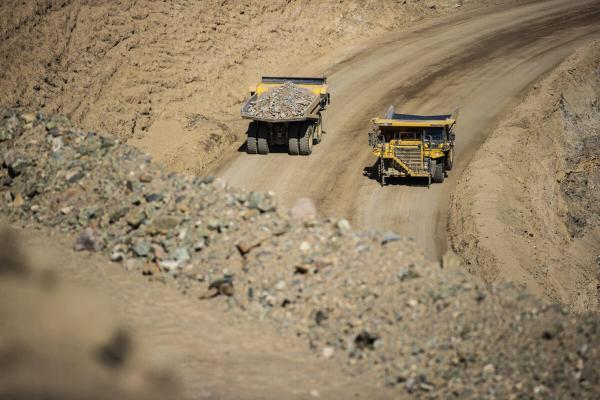
Join Distinguished Fellow Mike Gallagher and Congressman Rob Wittman (R-VA) for a discussion on the congressman’s recently introduced Securing Essential and Critical US Resources and Elements (SECURE Minerals) Act and Congress’s role in securing America’s economic security.
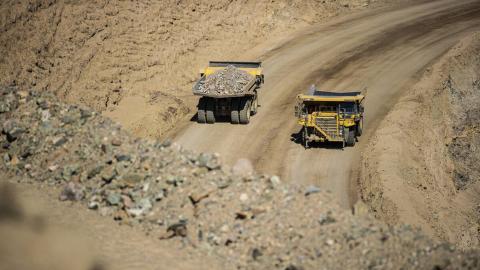

Join Hudson for an expert panel discussion on the latest policy developments and what an evidence-based approach means for the future of innovation.

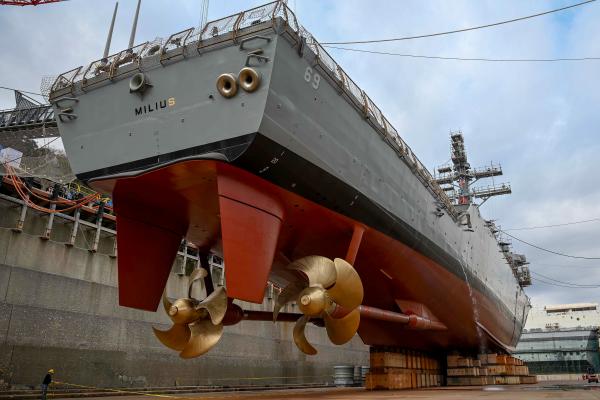
Join Hudson for a discussion highlighting each nation's approach to these common challenges, as well as how US-Japan collaboration should best proceed.
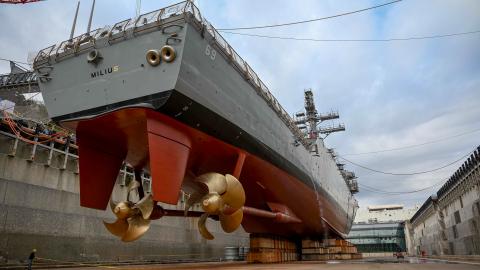
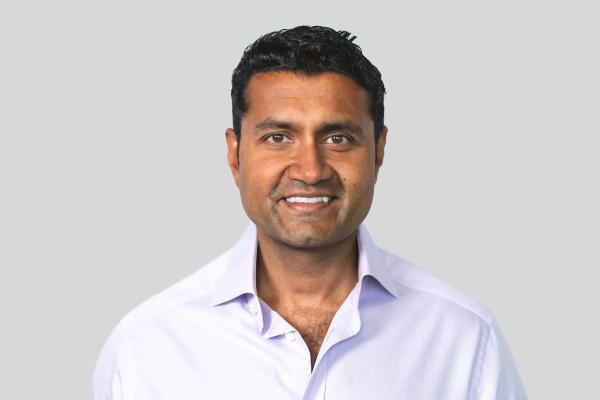
With Walter Russell Mead, Sankar will discuss his strategy to resurrect the American industrial base, win the twenty-first-century defense technology race, and prevent World War III.

